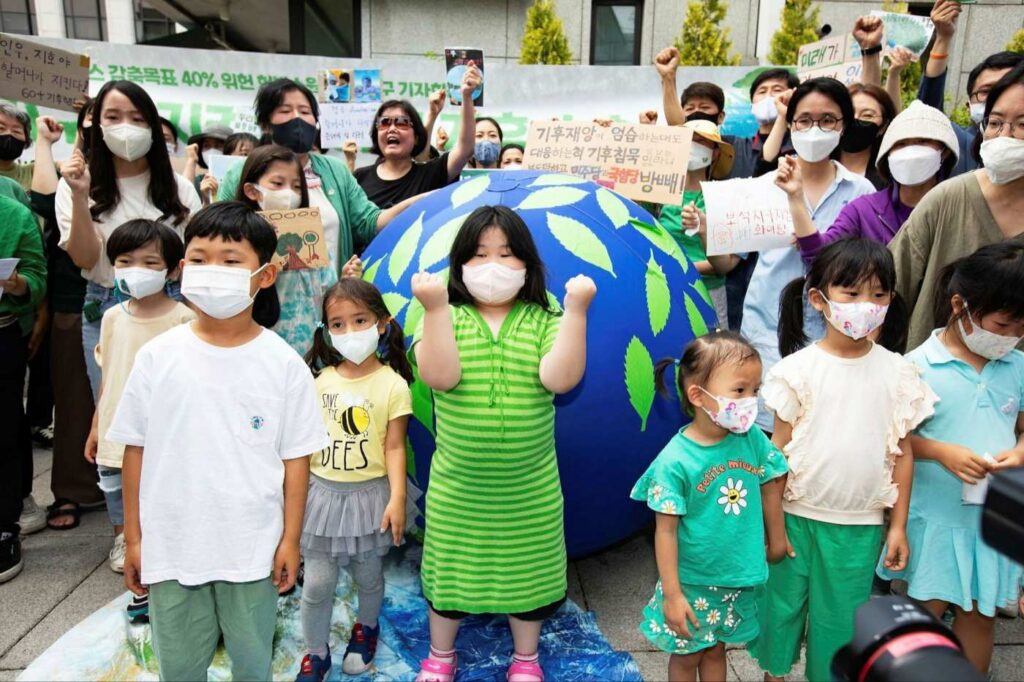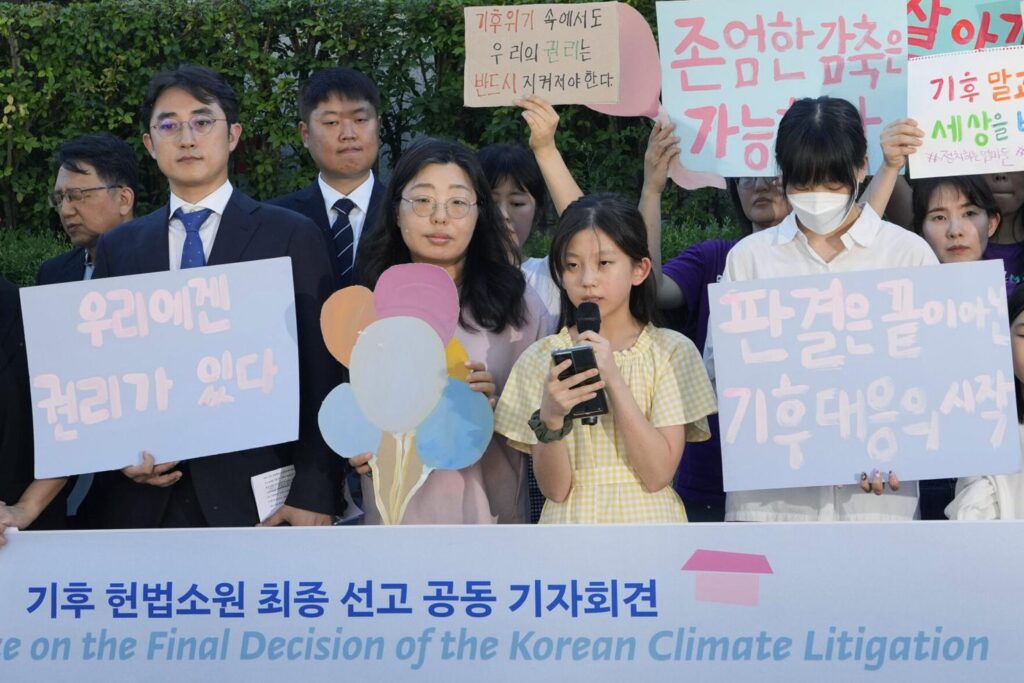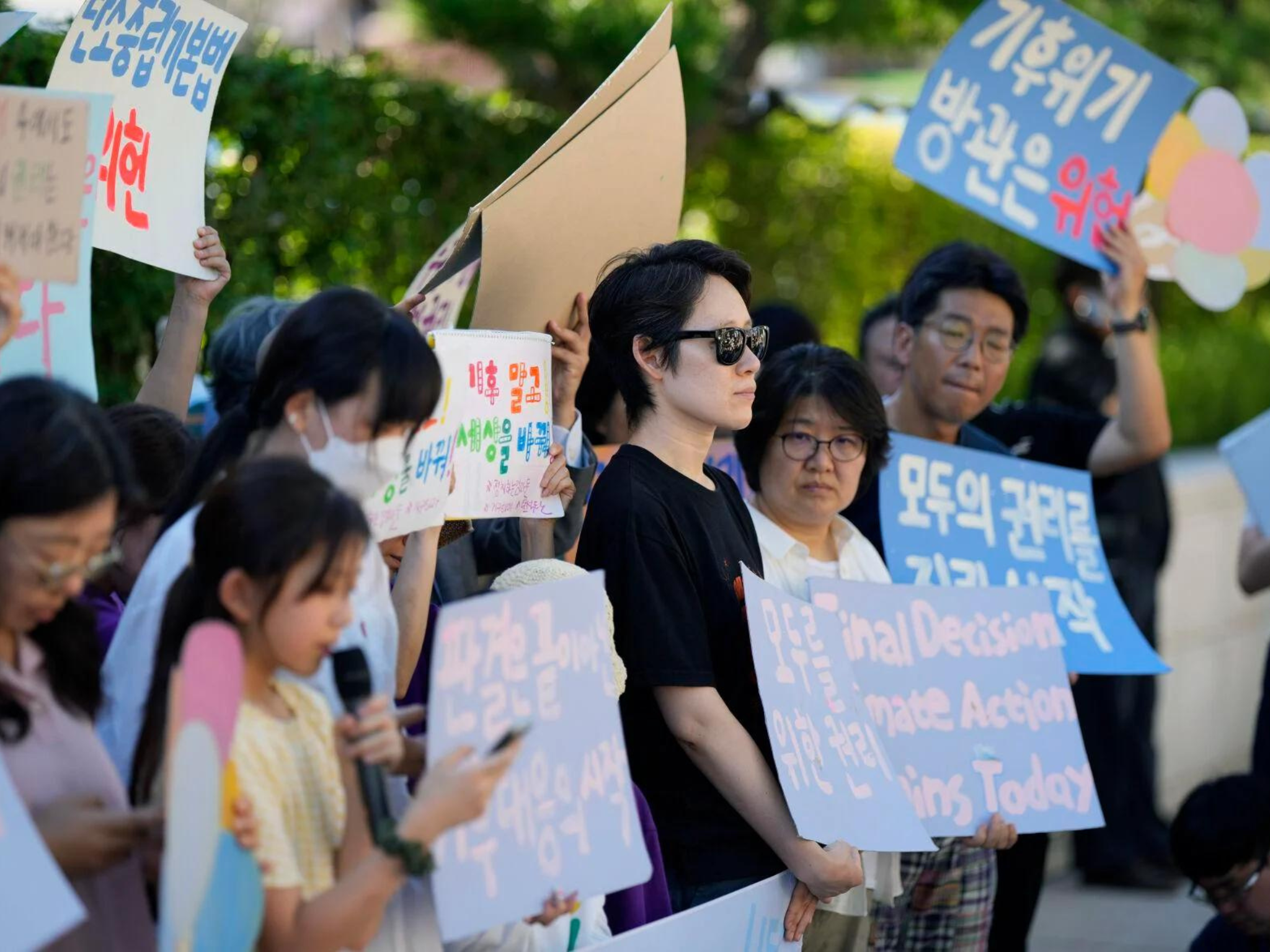5 Mins Read
In a landmark ruling, South Korea’s top court called on the government to strengthen its climate change action as the current policy does not protect constitutional rights.
South Korea’s climate law doesn’t do enough to protect the constitutional rights of future generations from the climate emergency, its top court has ruled.
In what is the first decision of its kind in Asia, the country’s Constitutional Court said part of the government’s climate change policy failed to safeguard basic human rights, ordering lawmakers to set firm emission reduction targets from 2031.
It concludes a process that began in 2020, with four petitions bundled into one case earlier this year, and the final hearing held in May. The precedent-setting verdict represents a human rights win for the 250-plus plaintiffs, many of whom were children when the complaints were first filed (one of them hadn’t even been born yet).
“This ruling marks the first victory in climate litigation in Asia,” the plaintiffs and their lawyers said. “The ruling could serve as a critical turning point, inspiring further legal actions across Asia to challenge insufficient climate policies.”
In response, South Korea’s environment ministry said it respected the decision and would implement measures to align with it.
No ‘quantitative’ emission cuts in South Korea’s post-2030 climate plan

Three of the petitions were from 2020, arguing against the country’s Framework Act on Low Carbon, Green Growth, claiming that the Enforcement Decree of the Carbon Neutrality Act is unconstitutional, and accusing the government of failing to shield fundamental rights, such as the right to life, right to pursue happiness, right to general freedom, right to property, and right to a healthy environment.
The fourth complaint, filed in 2020, was also partially based on the 2010 Carbon Neutrality Act, which mandated the government to set a target of reducing greenhouse gas emissions by at least 35% by 2030 (from a 2018 baseline). The government established a goal of curbing emissions by 40%, but the plaintiffs argued that this wasn’t enough to mitigate and adapt to climate change impacts.
But while the top court didn’t agree with that assessment – ruling that this near-term goal was sufficient and didn’t violate constitutional rights – it took issue with the strategy’s post-2030 plans.
The court ruled that the climate change law failed to specify “any quantitative levels” of emission reduction targets for 2031 to 2049 (South Korea plans to reach net zero by 2050): “It lacks the necessary minimal characteristics as a protective measure corresponding to the dangerous situation of the climate crisis.”
Following the decision, the court has given the government until February 28, 2026 to revise its policy and establish stronger climate measures. South Korea is the ninth-largest contributor to fossil fuel carbon emissions, according to the EU’s Emissions Database for Global Atmospheric Research.
It’s also the second-highest coal polluter among the G20 countries. But last year, it softened the target for the industrial sector, which now sits at an 11.4% reduction by 2030 (versus 14.5% set previously).
“There is some disappointment regarding the parts that were not upheld today,” the plaintiffs said, referencing the 2030 decision. “However, it is clear that today’s ruling represents meaningful progress in protecting everyone’s rights beyond the climate crisis.”
“I hope today’s decision will lead to a bigger change so that children do not have to file this kind of constitutional appeal,” added 12-year-old Han Je-ah, one of the plaintiffs. “The climate crisis is having a huge impact on our lives and there is no time to delay.”
Activists hope decision sets precedent in Asian climate cases

“Future generations will be more exposed to the impact of climate change, but their participation in today’s democratic political process is limited. So the legislators have the duty and responsibility to make concrete laws for mid- and long-term greenhouse gas reduction plans,” the court said.
According to the Climate Action Tracker, South Korea’s nationally determined contribution (NDC)to the 1.5°C target is “highly inefficient”. In fact, its current climate policies are currently only compatible with up to 4°C of temperature rises, compared to modelled domestic pathways. If all countries held this level of ambition, global heating would rise up to 3°C by 2100, a figure many climate scientists fear.
“Since there is no mechanism that can effectively ensure gradual and continuous reductions until 2050, it stipulates reduction targets that would transfer an excessive burden to the future,” the South Korean court added.
“The decision we face today is not just a victory for the plaintiffs who filed the lawsuit; it is an achievement for all those who have been excluded from the national climate response process while confronting the climate crisis,” the plaintiffs said.
Climate activists are hoping that the decision could influence climate litigation and national environmental policies in other Asian countries – similar cases are ongoing in Japan and Taiwan.
The South Korea verdict is the latest example of a fast-growing list of climate change cases globally: the governments of India, Pakistan, the UK, the Netherlands, Australia, Germany, and most recently (and controversially) Switzerland have been forced into doing more to fight the climate crisis. It has gone the other way too, with a court in Brazil ordering a cattle rancher to pay $50M in damages for destroying parts of the Amazon.
And in another case led by young people, climate activists in Montana, US scored a legal victory after a judge ruled that the state’s fossil fuel policy was violating their right to a clean and healthful environment.



